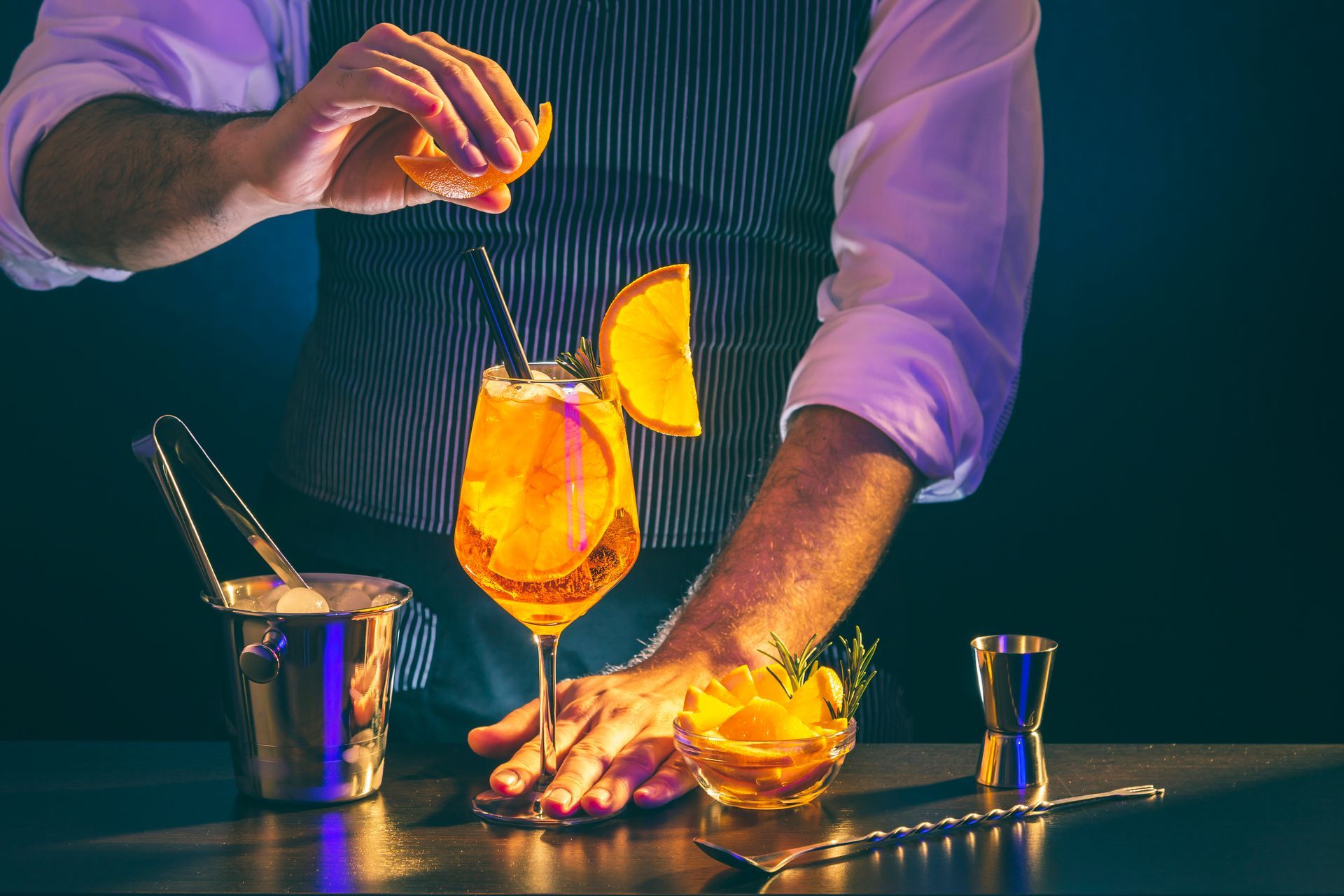Can You Train Yourself to Be a Bartender at Home? How to Be a Great Bartender Without Leaving Your Kitchen
If you've ever found yourself mesmerized by a skilled mixologist who seems to effortlessly serve drinks, pour with precision, and chat up customers while keeping calm under pressure, you may have wondered: Could I do that too? The answer is yes—with the right resources and commitment, you can absolutely train yourself to be a bartender at home.
In this article, we'll explore how to be a great bartender, even without formal experience, and how you can begin your bartending journey from the comfort of your kitchen. We'll also cover legal age requirements, essential bartending skills, and how Mr. Bartender's Bartender School in Jacksonville, FL can help fast-track your bartending career.

What It Takes to Be a Great Bartender
Becoming a great bartender is part art, part science, and entirely about creating memorable guest experiences. It’s more than just knowing how to pour a drink; it’s about understanding your role as an entertainer, technician, and responsible service provider. Here’s a closer look at the foundational elements that make up a truly great bartender:
1. Mastering Drink Knowledge
A great bartender knows their drinks—not just how to make them, but the story behind them. Learn the classics and expand to craft cocktails. Understand the profiles of each spirit, including vodka, gin, rum, tequila, whiskey, and liqueurs. Familiarize yourself with beer and wine varieties and how they pair with food or social settings.
2. Practicing Technical Skills
Whether you're behind a real bar or your kitchen counter, technical prowess is critical:
- Accurate pouring and measuring
- Knowing when to stir vs. shake
- Building drinks efficiently in the correct glassware
- Managing a bar station
- Garnishing and presenting cocktails with style
- Use tools like a jigger, shaker, and strainer, and practice techniques until they become second nature.
3. Developing Speed and Efficiency
A good bartender is fast without sacrificing quality. Use repetition drills to improve your muscle memory and workflow. This will help when you’re eventually in a fast-paced service environment.
4. Customer Service and Charisma
Bartenders are part show-person, part therapist. Being able to make patrons feel welcome, remember regulars’ preferences, and carry on light conversation is a huge plus. Emotional intelligence and communication are just as important as your mixing skills.
5. Understanding Responsible Alcohol Service
Professional bartenders must know when and how to say no. Learn to check IDs, monitor intoxication levels, and refuse service with tact. Knowing local laws, age restrictions, and responsible service techniques is critical to staying compliant and keeping guests safe.
6. Cleanliness and Organization
Hygiene matters. Wipe down your workspace regularly, wash tools between uses, and keep your bar stocked and organized. Great bartenders move with precision and purpose, making their work look effortless and clean.
7. Continuing Education and Passion
Trends change. New spirits hit the market. Customers ask for drinks they saw on social media. Stay curious. Attend tastings, follow mixology influencers, read bartending books, or take courses. If you’re passionate, you'll never stop improving.
In short, the journey of learning
how to be a great bartender is one of continuous growth, and starting at home gives you the perfect environment to hone your skills without pressure.
How to Be a Bartender Without Experience
Many aspiring bartenders worry about how to get started if they’ve never worked behind a bar before. The truth is, you don't need professional experience to begin your journey—you just need curiosity, consistency, and a willingness to learn. Here's how to break into bartending with no professional background:
1. Set Up a Home Bar
Create a space in your home where you can safely and comfortably practice. Invest in basic tools like a shaker, jigger, strainer, muddler, bar spoon, and a variety of glassware.
Stock your home bar with essential spirits like vodka, rum, gin, tequila, whiskey, and a few mixers such as soda, tonic water, and citrus juices. A simple bar setup is more than enough to begin building your foundation.
Use this environment to simulate real-world bartending: line up multiple drinks to prepare, practice keeping your workspace tidy, and challenge yourself to move efficiently.
2. Learn Through Online Resources
Leverage the internet to absorb as much information as you can. There are countless free and paid resources to help you get started:
- YouTube channels run by professional mixologists
- Bartending apps with cocktail databases and tutorials
- E-books and PDFs on recipes, bar management, and responsible service
- Online forums like Reddit’s r/cocktails where you can ask questions and share your progress
- Practice pouring to the count, memorizing popular recipes, and understanding how different ingredients work together.
3. Get Real-World Practice with Friends and Events
Offer to bartend for small events like birthday parties, BBQs, or game nights. Treat these as real gigs: take drink orders, work quickly, and be attentive to your “customers.” It’s an excellent way to build confidence and identify areas where you can improve.
Keep in mind, if alcohol is being served, it’s still important to follow local age restrictions and responsible service practices—even in informal settings.
4. Join a Bartending School
If you're serious about turning bartending into a profession, enrolling in a bartending school is one of the fastest and most effective ways to gain comprehensive training.
This is where Mr. Bartender's Bartender School in Jacksonville, FL shines. Their programs are designed for complete beginners and provide:
- Hybrid, online, and in-person certification courses for flexibility
- Beginner to Pro training with customizable packages based on your goals
- Virtual and hands-on workshops that simulate real bartending environments
- Business coaching for aspiring mobile bartenders and event bar services
Whether you're looking to land your first job or start your own bartending business, Mr. Bartender equips you with the skills, confidence, and support network needed to succeed. Their strong job placement assistance also helps bridge the gap between learning and employment.
How Old Do You Need to Be a Bartender?
Legal age is one of the most frequently asked questions for anyone considering a bartending career. Whether you’re looking to serve drinks at a nightclub, restaurant, or private event, understanding the legal age requirements is essential to ensure you're operating within the law.
How Old to Be a Bartender in Florida?
In Florida, the minimum age to bartend is 18 years old, provided you're working under the supervision of someone who is of legal age and you’re serving alcohol according to state law. This means that at 18, you can legally serve alcoholic beverages such as beer, wine, and spirits—but only in establishments that follow the proper responsible alcohol service guidelines.
However, certain venues—especially those with late-night hours or complex liquor licenses—may still prefer or require their bartenders to be 21 years or older. This is often due to insurance requirements, liability concerns, or the types of drinks being served (such as high-proof spirits).
How Old Do You Need to Be a Bartender in Other States?
Bartending age requirements vary widely by state across the U.S. While some states allow you to bartend at 18, others may require you to be 19, 20, or even 21. Here are a few examples:
18 years old: Florida, Texas, Oregon, and Ohio
19 years old: Alaska, Nebraska
21 years old: Utah, Nevada, and parts of California (depending on local laws)
Some states also have differing age restrictions based on whether you’re serving beer and wine only, or handling hard liquor as well.
Why Do Age Requirements Vary?
Age restrictions depend on a combination of:
- The type of alcohol being served (beer, wine, spirits)
- The venue’s liquor license and business model
- Whether the alcohol is consumed on-premise (like a bar) or off-premise (like a liquor store)
- County or city-level regulations that impose stricter rules than the state
For example, while Florida sets the minimum age at 18, a county ordinance or employer’s policy might still require bartenders to be older. This is especially true for bartenders expected to manage the bar alone, handle large cash transactions, or supervise other staff.
Always Check Local Regulations
Because laws vary so much from place to place, it’s crucial to research the specific regulations in your city or county. If you’re planning to attend a bartending school or apply for jobs, confirm the legal age to bartend in your jurisdiction beforehand.
Your age might also affect whether you can obtain certain certifications or licenses required by your state or employer—especially those related to responsible service, such as TIPS or ServeSafe Alcohol.
In summary, while 18 is the minimum age in many states, including Florida, there are plenty of exceptions. Make sure to double-check your local guidelines to stay compliant and job-ready.
Responsible Alcohol Service
Bartenders are not just party facilitators—they play a critical role in protecting the health and safety of their guests and the broader community. Serving alcohol responsibly is a fundamental part of the job and reflects your professionalism and commitment to your role.
Here’s what responsible alcohol service really means:
1. Understanding How Alcohol Affects the Body
Different types of alcohol and serving sizes impact individuals in various ways. A good bartender understands how beer, wine, and spirits affect the human body, especially when consumed over time. This includes recognizing factors like body weight, food intake, and tolerance levels.
2. Spotting Signs of Intoxication
A responsible bartender is trained to recognize when a guest may be approaching or has reached the point of intoxication. Signs include slurred speech, lack of coordination, aggressive behavior, and slow reaction times. Acting early can prevent unsafe situations such as fights, accidents, or drunk driving.
3. Refusing Service When Necessary
Though it can be uncomfortable, refusing to serve an intoxicated patron is sometimes necessary—and often legally required. A good bartender knows how to do this diplomatically and with confidence. It's about protecting the guest, other patrons, and your establishment from liability.
4. Checking IDs and Enforcing Age Restrictions
Bartenders must verify that all guests being served alcohol meet the minimum age requirements. Always check IDs carefully—particularly in areas with strict age enforcement or large crowds. Know the signs of fake IDs and don’t be afraid to deny service if you’re uncertain.
5. Knowing Local Laws and Regulations
Laws around alcohol service vary not only from state to state but also between counties and cities. Bartenders should be familiar with:
- Last call times
- Limits on drink specials (e.g., happy hours)
- Rules about serving visibly intoxicated patrons
- Legal liabilities for overserving
6. Obtaining Certifications
Many employers require or prefer bartenders to have a responsible service certification. Two common programs include:
TIPS (Training for Intervention Procedures)
ServSafe Alcohol
These certifications teach bartenders how to handle tricky situations, ensure compliance with the law, and promote a safer drinking environment. In some states, having one of these certifications is mandatory before you can legally serve alcohol.
By prioritizing responsible alcohol service, you’re not only protecting guests—you’re also elevating your own standards as a professional bartender. It's a key trait of anyone striving to learn how to be a great bartender.
Can You Really Become a Successful Bartender from Home?
Absolutely. Many professional bartenders got their start practicing at home. Here's what a realistic home-training plan could look like:
Week 1: Learn the Tools and Liquors
- Practice identifying spirits
- Learn how to measure and pour accurately
Week 2: Basic Cocktails and Techniques
- Mix 5 classic drinks
- Practice stirring and shaking techniques
Week 3: Bar Setup and Efficiency
- Design your ideal home bar
- Practice restocking and cleaning routines
Week 4: Mock Service
- Serve drinks to family or friends
- Time yourself and ask for feedback on presentation and flavor
Ongoing: Enroll in Courses
Take online modules or in-person classes at Mr. Bartender's Bartender School
Attend weekend workshops or business coaching sessions if you’re considering mobile bartending
Why Choose Mr. Bartender's Bartender School in Jacksonville, FL?
If you want to move beyond home practice and make bartending a serious career, this school offers a powerful jumpstart.
What You'll Get:
- Certification programs to help you meet employment requirements
- Career-focused instruction from seasoned bartenders
- Hybrid learning formats for flexibility
- Job placement assistance for both local gigs and traveling events
- Hands-on learning and role-play scenarios
- Networking opportunities with venues and catering companies
Whether you’re looking to become a full-time bar manager or want to explore mobile bartending as a side hustle, Mr. Bartender helps you level up your bartending skills fast.
Final Thoughts: You Don't Need a Bar Job to Start Your Bartending Journey
So, can you train yourself to be a bartender at home? Yes—and with dedication, the right tools, and expert guidance, you can become a successful bartender without stepping into a bar on your first day.
If you're ready to take the next step and get serious about your craft, let Mr. Bartender's Bartender School in Jacksonville, FL show you the way. Whether you're 18 or 21, hobbyist or aspiring pro, our flexible programs make it easier than ever to learn how to be a great bartender.
Ready to Get Started?
Join the hundreds of students who’ve jump-started their bartending careers at Mr. Bartender’s Bartender School. Learn how to mix, pour, and serve like a pro—whether from your kitchen or behind a bar.
Contact us today to explore courses, pricing, and upcoming workshops. Cheers to your new bartending journey!
Cheers!

